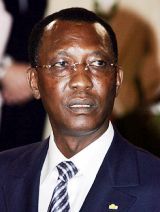Chadian forces face worst rebel fighting in two decades
December 8, 2007 (NDJAMENA) — Chadian troops, boosted by a vastly improved arsenal, are mounting a stiff resistance to the worst rebel attacks in nearly 20 years but insurgents in the central African nation appear ready for a fight to the finish.

However, the army is managing to cope with the attacks mainly due to new weaponry funded by Chad’s recent oil wealth. The country started producing oil in 2003 and has rapidly become one of Africa’s main petroleum producers.
The Rally of Forces for Change (RFC) and the Union of Forces for Democracy and Development (UFDD), the two main rebel groups, have said recently they are coordinating their battle against Deby’s regime.
The Chadian army fought heavy battles against RFC forces Tuesday in the east near the border with Sudan’s troubled Darfur region, prompting warnings from the UN of an impending refugee crisis.
The UFDD has fought three major battles with the army, also in eastern Chad, in recent days.
A western observer said a peace pact signed on October 25 in the Libyan town of Sirte was all but dead as the rebels had inked it “while preparing for war.”
UFDD supremo Mahamat Nouri echoed him saying “nobody believed” in the peace accord.
“It was just to please the Libyan guide (Moamer Kadhafi) who put pressure on us,” added Timan Erdimi, head of the RFC.
There are two other rebel outfits involved in the current fighting — the Popular Front for National Rebirth (FPRN) which is thought to be a minor group — and the United Front for Change (FUC).
Around November 25, the UFDD and RFC quit their rear bases in neighbouring Sudan and clashes started a day after that.
“There are two hypotheses,” said an expert clued in on the fighting. “Either Sudan has decided not to back the rebels any longer and have them leave. Or Sudan is continuing to back them so they keep up the attacks, one after the other.”
The government meanwhile says it is far better equipped to tackle the threat as its soldiers are far better armed as compared to last year.
“Since then we are equipped, mainly thanks to oil money,” an aide to Deby said. “Last year, we had the same level of firepower as the rebels. Today we are in a superior position and the rebels are struggling to unite.”
However, the Chadian army has suffered heavy losses in the latest fighting.
The first battle between the government forces and UFDD on November 26 at Abou Galem, nearly 90 kilometres (56 miles) from Abeche — the main town in eastern Chad — was intense, deadly and led to fairly even casualties on both sides.
But successive battles in the border region of Sudan were to the advantage of the government troops, the expert following the clashes said.
“Mahamat Nouri’s forces have lost most of their men,” he said. “It remains to be seen whether they have reinforcements in Sudan.”
The UFDD has not been active for a week and are thought to be reorganising.
Nouri hinted as much saying: “Both sides are tending to their wounds but the next battle will be decisive.”
Clashes between the RFC and the army this week were less violent and the rebels managed to withdraw.
Rebel attacks have followed a seasonal pattern in Chad over the past three years, beginning in October-November at the end of the rainy season. However the fighting last year was far less intense than this time round.
A Chadian official admitted that the army “which has far superior manpower and weaponry had been badly affected,” adding that the “president has lost more than 10 members of his close entourage.”
Fighting appeared to have lulled on Thursday in spite of stray attacks in the southeast by minor rebel groups.
But the government warned it was always on guard to tackle fresh attacks.
Meanwhile, the UFDD on Friday launched another warning about a planned 3,500-strong French-led EU peacekeeping force in Chad and the Central African Republic.
“We are very distrustful because France is heavily involved in this force,” Mahamat Hassileck Halata, a UFDD official, told reporters in Paris.
“What we have been told is that this is a smokescreen to save … Deby,” he said. “If that is the case, we will send them back.”
(AFP)
